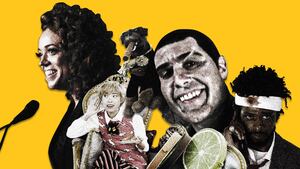In the early 1700s, a physician named James Douglas, a quasi-famous midwife known for performing public dissections of female pelvises in his home, came across a wrinkle of uterine flesh he hadn’t seen before. The region was a tiny cavity, sort of like a kangaroo’s flap, which expands if a woman needs more room during pregnancy. The doctor called his anatomical New World the “Pouch of Douglas.” Medical dictionaries describe Douglas’ revelation as “an extension of peritoneum between the posterior wall of uterus and the rectum in females,” but it’s basically a reproductive crawl-space. As findings go, it’s about as close as you can get to discovering nothing. In comedian Hannah Gadsby’s latest stand-up set, a work-in-progress which runs through March 9 at the Hayworth Theater in L.A., she describes the little flap in her opening monologue. “It’s a potential space,” she told the crowd. Gadsby’s calling her new show “Douglas.”
If there’s a specific subtext behind the choice to name her set after the nothing-discovery of an 18th century pelvis dissector, Gadsby doesn’t mention it outright. Douglas is also the name of her dog. But the new show arrives on the heels of Nanette, a comedy special which aired on Netflix last summer, sending waves through the think-piece internet and comedy Twitterverse. The special, for those who managed not to hear about it, had nothing to do with the name Nanette, and everything to do with a problem Gadsby saw in her industry—namely, an expectation that comedy minorities make themselves the butt of the joke. The polarizing show, which begins as a fairly unremarkable set, before taking a serious twist into Gadsby’s account of a hate crime, prompted two tiresome debates: one over whether it heralded the end of stand-up, and another over whether it constituted stand-up at all. But whatever the special meant for its genre, Nanette signaled something fairly straightforward about Gadsby’s career: “I’m quitting,” she told the crowd. She didn’t, as it turns out. And in Douglas, the comic is workshopping what, exactly, not-quitting looks like.
“It’s hard to know what this show should be,” Gadsby told the audience Thursday night, “because I quit comedy.” Douglas is a work-in-progress at its most fundamental. (“This is rough as guts,” she says at one point, “but I feel pretty comfortable, because Nanette wasn’t funny, and, well...”) A willfully half-finished ninety minutes of performance, it’s almost admirably sloppy. Gadsby zig-zags between subjects, goes on long tangents, cuts herself off mid-sentence, drops huge, sometimes hackneyed, personal bombshells, and practices crowd-work to varying, occasionally laborious, degrees of success. But with any rough draft, the audience bears witness to all the potential versions a piece might become, and in Douglas, Gadsby seemed to be staring down two possible paths.
However people felt about Nanette, part of what made it unusual and noteworthy was Gadsby’s ability to repackage an oppressively familiar theme—the sidelining of marginal voices in comedy—in a surprising, inarguably novel way. In Douglas, the comic seemed to struggle with finding a way to talk about similar subjects with equal originality, often falling back on woke cliches and one-dimensional girlbossery, as if parroting Resistance catchphrases could do both comedic and analytical labor for her. “The U.S. is the straight white man of culture,” she says at one point. In another moment, while running off a series of allegedly unpopular opinions, Gadsby manages to compile an almost universally agreed upon list of enemies (bikini models, the paleo diet, golf, atheists, chivalry, Elon Musk, to name only a few). “Believe women,” she adds later, almost out of the blue.
But between jargon and buzzwords, the comic occasionally emerged with the surreal, self-aware weirdness that has become part of her signature. In the recurring motif of workshopping her crowd work, Gadsby distilled a few moments of pitch-perfect small-talk awkwardness. In others, during an extended bit on Renaissance artwork, she managed to splice the expert commentary of an art history major with the jarring non-sequitur of an Adult Swim show.
Gadsby never returns to the Pouch of Douglas, after she first describes it. Like so many of the set’s threads, the idea sort of hovers in the background, a potential theme, not unpacked. Instead, to signal the end of the act, the comic takes a sip of water. “Well, that’s it,” she says. “The show’s over, for now.”
An earlier version of this article included a spoiler from the show. The Daily Beast regrets the error.







